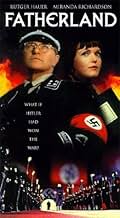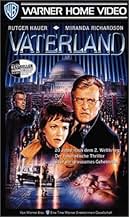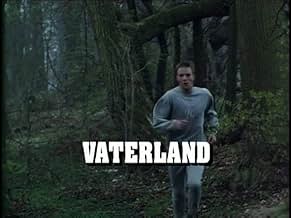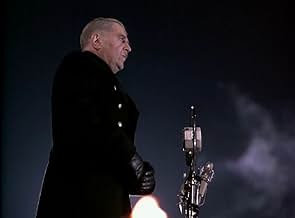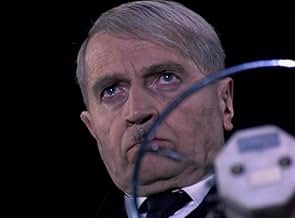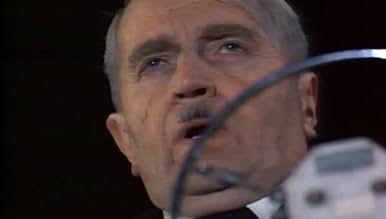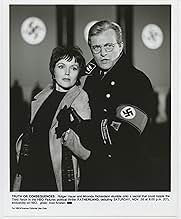Añade un argumento en tu idiomaIn April 1964, more than twenty years after the Nazis won World War II, S.S. officer Xavier March uncovers a plot to eliminate the attendees of the Wannsee Conference so that Germany can est... Leer todoIn April 1964, more than twenty years after the Nazis won World War II, S.S. officer Xavier March uncovers a plot to eliminate the attendees of the Wannsee Conference so that Germany can establish better relations with the U.S.In April 1964, more than twenty years after the Nazis won World War II, S.S. officer Xavier March uncovers a plot to eliminate the attendees of the Wannsee Conference so that Germany can establish better relations with the U.S.
- Nominado para 1 premio Primetime Emmy
- 3 premios y 5 nominaciones en total
- Guide Helga
- (as Petronella O. Barker)
Argumento
¿Sabías que...?
- CuriosidadesThe pompous buildings in post-war Berlin were based on actual plans by Albert Speer, Adolf Hitler's favorite architect and secretary of armaments. Amongst several other landmarks we see a huge dome (the Reichhalle) a Triumph Arch, an Olympic Stadium, and the Reich's Chancellorship. Only the Stadium and the Chancellorship were actually built, but the later was wrecked by bombings and finally looted and demolished by the Red Army. The rest of them were never built, and constructions like the Arch and the Dome were so massive, that architects were unsure of their viability, until recent computer-based simulation have stated that Speer's calculations were correct, and had Hitler won the war, Berlin would have pretty much looked as the movie shows. Interestingly, the movie also portrays Berlin as bleak and gray. In the book, March describes the city looking like this from the never ending construction projects.
- PifiasMost measurements are given in metric, used in Germany since 1876, however when Luther is trying to escape at the metro station his height is given in feet and inches and his weight in pounds.
- Citas
Narrator: [opening narration] It has been 20 years since the Second World War ended with the failure of the Allied invasion of Normandy. A triumphant Hitler declared victory over Europe and the British Empire. The United States withdrew from the conflict, listening to those like Charles Lindbergh, who had argued against a war with Germany. In the East, only the Russians fought on in a bitter guerrilla war. American efforts turned to retribution for Pearl Harbor. That came in the summer of 1945, with victory over Japan. By then, American general Eisenhower returned from Europe to the United States and a humiliating retirement. In 1947, King Edward and Queen Wallis assumed the British throne. Winston Churchill, who had barely escaped with his life after Normandy, died in exile in Canada in May 1953. In the years after the war, country after country of the old Europe had become part of the vast Nazi empire of Germania. The Fuhrer's architect, Albert Speer, built a monument to the Thousand-Year-Reich. Germania's capital, Berlin, became a Nazi showplace. The SS became a peacetime police force, patrolling clean, orderly streets. As the '50s came to a close, Hitler was able to put a more civilized face on the Greater Reich, but news continued to be tightly controlled. The '60s began with the war with the Soviet Union still dragging on. Hitler desperately needed to conclude a formal peace with the United States and forge an alliance against the Russians, still led by the 85-year-old Joseph Stalin. Hitler saw signs of hope in late 1960 with the election of a new President of the United States. The Fuhrer believed with President Joseph Kennedy Sr. in office, at last there would be someone with whom a deal can be struck. Now in 1964, for the first time in 20 years, Germania's borders are being opened to the Americans. The world press is being invited to cover the Fuhrer's birthday celebration on April 20th. There are rumors that President Kennedy will attend a Germanian-American summit conference. An alliance with America would ensure Germania's invulnerability... but there are more persistent rumors that could threaten Hitler's plans. There are stories that something terrible happened in Germany during the war. That the official Nazi story that Jews and other minorities were relocated to the East, wasn't true. There are also rumors that in the Greater Reich, terrible things are still happening. Television, radio, and newspapers are controlled by the powerful Ministry of Information. Nobody, in a new Berlin, dares to ask awkward questions.
- Créditos adicionalesSarah Berger is credited as as Leni Kalder but is called "Anna" by Xavi.
- Versiones alternativasAfter the film aired on HBO, a few changes were made for the VHS version. The opening montage of black and white newsreel footage had two or three sentences of narration replaced and the accompanying images changed. In addition, a line was added to the end, an announcer heard over loudspeakers, saying that "President Kennedy is leaving Germany, taking with him the warm wishes of the German people," to make it totally clear to the audience that Kennedy had decided to abandon the alliance with Hitler.
- ConexionesFeatured in The 52nd Annual Golden Globe Awards (1995)
Without any knowledge of the book, the film is excellent. A tense thriller set in a unique setting with presentation that makes anyone who enjoys historical stuff (like myself) engrossed. The alternative history, the Albert Speer architecture, the carefully thought out references to actual historical events such as the bombing of Dresden and the nuclear attacks on Japan. Both of which are considered war crimes by many, allowing for a small hint of socio-political commentary.
The flaws lie in the plot, which has significantly deviated from the book, in that the ending seems over-dramatic. I will not spoil it but those of you who have read the book will possibly agree that the ending to the novel is more intense, subtle and powerful. Rutger Hauer's performance is excellent, well acted and his style is perfectly fitting of a character like Xavier March. Miranda Richardson plays the role of Charlie Maguire solidly, at times a little wooden and restrained.
All in all, the film is a decent homage to Robert Harris' most famous, and arguably his best, novel. For a low budget, mid 90s TV movie, I am impressed. I would love to see a new adaptation of the book, perhaps with a longer runtime (less condensation) and with a larger budget?
- Euan_McIntosh
- 16 jul 2014
- Enlace permanente
Selecciones populares
Detalles
- Duración1 hora 46 minutos
- Color
- Mezcla de sonido
- Relación de aspecto
- 1.33 : 1
Contribuir a esta página


